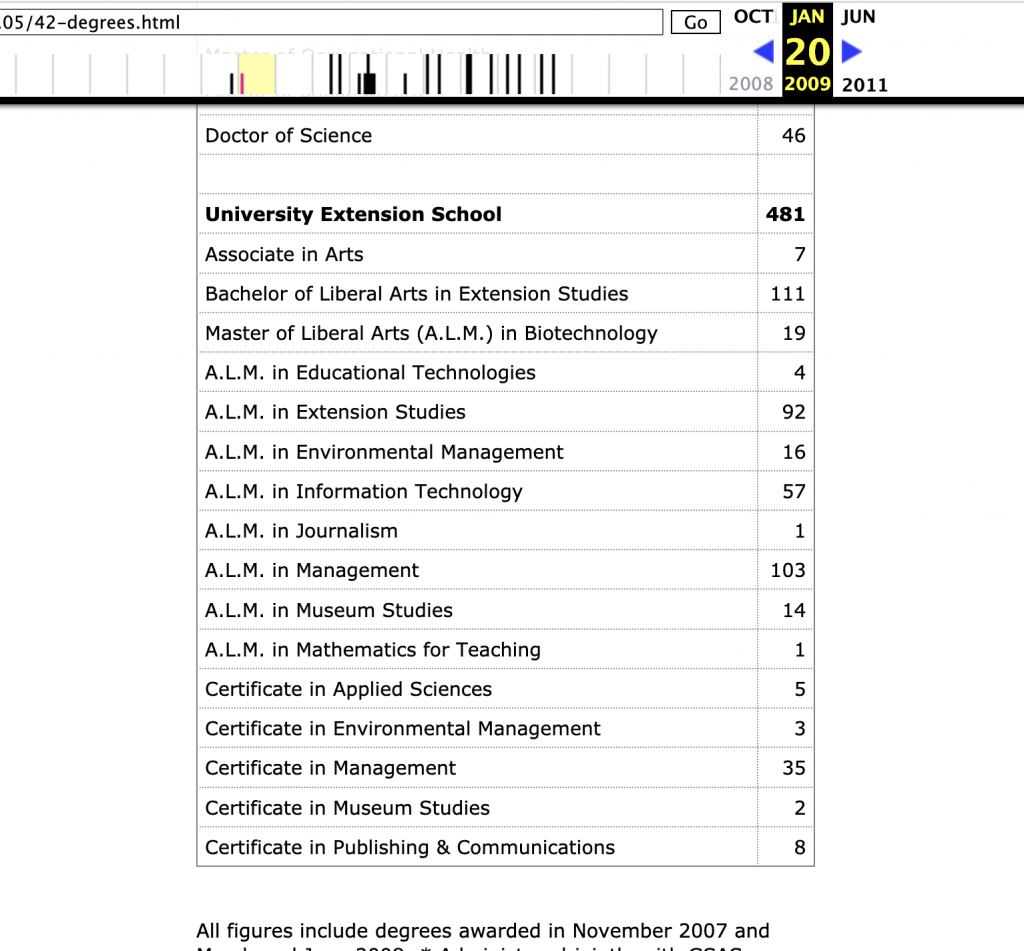In 13 years, the number of degrees awarded by the Harvard Extension School has nearly tripled to 1,340 degrees in 2021, most of them ALMs. What’s going on? This blog post will analyze the trends taking place at the Harvard Extension School.
Here’s a screenshot of the Gazette article from my 2008 graduation, showing the breakdown of degrees.
“In Extension Studies” are liberal arts ALB/ALM degrees; at the time professional ALM degrees were labelled by concentration. Certificate programs no longer exist.
How did HES go from 481 to 1,340 in 13 years?
- First, it dramatically expanded online courses.
- Then, it added more concentrations outside of the liberal arts.
- Finally, it reduced or eliminated “Harvard Instructor” requirements, greatly increasing faculty and class pool.
According to a letter sent to me by the Extension School in July 2010, the professional programs’ “Harvard affiliate requirement” was replaced by “advisory board oversight,” which the Extension School suggested would provide “better quality control”.
The letter stated the change would allow the Extension School to recruit more talented faculty from other area schools as well as working professionals from outside Harvard, which is exactly what happened.
The Harvard Extension School did this because it wanted to expand the professional programs but couldn’t do it, even with the loose “Harvard Affiliate” standards at the time, which included Harvard’s professional staff counting as a Harvard instructor.
The 2010 letter, which came out during the tenure of former Dean Michael Shinagel, was addressing a problem HES encountered in expanding its professional degree programs. Unlike the Harvard Faculty of Arts and Sciences, which includes Harvard College and the Graduate School of Arts and Sciences, some professional Harvard schools did not want its faculty or instructors to participate in any Extension programs, even if it was at night.
This was the case with the Harvard Business School. For years, the only HBS faculty teaching HES classes in finance, management, or business were retired. Even now, there is only a single faculty member listed in the Extension School instructor list:
The Extension School also decided to offer degrees in areas in which no Harvard faculty exist, such as journalism and digital media arts.
Expansion of learning opportunities across the globe has been a positive trend, as has new degree types serving the needs of students and industry. The HES biotechnology degrees are a great example of this.
But the idea that you can receive a degree from Harvard without ever taking a class with Harvard faculty members is a major mistake. It’s a sharp deviation from the Extension School’s mission to offer a Harvard academic experience led by Harvard faculty members, and opens up the school and alumni to criticism that HES degrees aren’t “real” Harvard degrees.
I’m not knocking the hard work of students or the non-Harvard faculty teaching such classes. I too have taken classes with non-Harvard faculty that counted toward my degree, and some were top-notch and truly global experts in their fields, such as the late Thomas J. O’Connor. This was sometimes through the Harvard Summer School, which is also open to Harvard College students. And Harvard certainly has a long history with visiting faculty from other institutions.
But the idea that it’s possible to get a Harvard degree without taking any classes with Harvard faculty? The school might as well just let students transfer in 100% of class credit from other schools.
And that’s not right. As I stated in my final post on the old Harvard Extended blog:
While recruiting professors from Boston University, Bentley, Boston College and UMass will improve the quality of the instruction in these programs, it is a tacit acknowledgment that the professional degree programs have failed to fit the model established by the Extension School to offer a Harvard academic experience led by Harvard faculty members to students. It further sets a precedent for launching new professional degree programs that have no connection to the University’s existing areas of study, and opens the door to criticism that Harvard Extension School degrees aren’t “real” degrees because they no longer represent study under Harvard’s top-notch faculty.
Harvard Extension School students are already treated like second-class entities by the University and even the Harvard Extension School’s own leaders and staff. Watering down requirements may make things more convenient and profitable for the Extension School, but it hurts the goals of matriculated students and alumni who want equal treatment, respect for our hard work, and a true Harvard educational experience.




